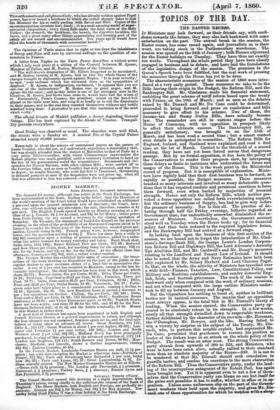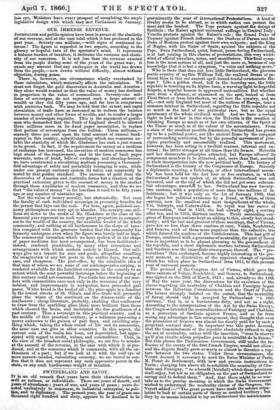TOPICS OF THE DAY.
THE EASTER RECESS.
Ir Ministers may look forward, as their friends say, with confi- dence towards the future, they may also look backward with sonic satisfaction on the past. The annual break in the session, the Easter recess, has come round again, and journalists as is their wont, are taking stock in the Parliamentary warehouse. The session was opened on the 24th of January ; both Houses adjourned for the Easter holidays on Tuesday. They have thus sat exactly ten weeks. Throughout the whole period they have been closely engaged in business and in debate, and have laid the foundations of the legislative design of the session. The promises in the Queen's Speech have been fulfilled, but the real work of pressing the measures through the House has yet to be done.
The characteristic measures of the session of 1860 were intro- dueed at a very early period. These measures we take to be the Bills having their origin in the Budget, the Reform Bill, and the Bankruptcy Bill. Mr. Gladstone made his financial statement, unfolding the great scheme of tariff reform based upon the treaty with France, on the 10th of March; and as soon as the debates raised by Mr. Disraeli and Mr. Du Cane could be determined, proceeded to bring forward and press on resolutions and bills necessary to give effect to his scheme. Two of these, the Income-tax and Stamp Duties Bills, have actually become law. The remainder are still in various stages before the House of Commons, with no opposition in prospect likely to affect their ultimate success. The Bankruptcy Bill, so generally satisfactory, was brought in on the 15th of March, and has been read a second time ; but a smart contest over details is anticipated in committee. The Reform Bills for England, Ireland, and Scotland were explained and read a first time on the 1st of March. Carried to the threshold of a second reading, they have not yet been forced across that dangerous passage. Met by no formal opposition, it has been the policy. of the Conservatives to render their progress slow, by interposmg those delays so facile to tacticians who understand the forms and usages of the House. This is the weak point in the Ministerial record of progress. But it is susceptible of explanation. Minis- ters have rightly held that their first business was to forward, as rapidly as possible, the Budget measures. These measures touched so many interests and involved so many debateable ques- tions that it has required resolute and persistent exertions to force them forward, even when backed by majorities of unusual strength. Hence not only the Reform Bills, which neither pro- voked a fierce opposition nor called forth overwhelming support, but the ordinary business of Supply, has had to give way before the pressure of necessity. Nor is this all. The practice of de- bating through half the Friday evenings, hitherto regarded as Government time, has undoubtedly somewhat diminished the re- sources of Ministers. Nevertheless, the Government account stood well on Tuesday when the House broke up ; for its financial policy had then been reduced to the required legislative forms, and the Bankruptcy Bill had arrived at a forward stage.
In looking back upon the business of this first section of the session, we are bound not to forget the introduction of Mr. Glad- stone's Savings-Bank Bill, Sir George Lewis's London Corpora- tion Reform Bill and Highways Bill, the Lord Advocate's Annuity Tax Abolition Bill, and Mr. Cardwell's and Mr. Deasy's measures relating to the Landlord and Tenant Law of Ireland. It should also be noted that the Army and Navy Estimates have both been ably explained by Mr. Sidney Herbert and Lord Clarence Paget. So that, on the whole, the activity of Ministers has travelled over
a wide field—Finance, Taxation Constitutional Policy, our Military and Maritime establishments, and sundry domestic Eng- lish, lish, Irish, and Scottish grievances. The work of the session s backward only when compared with the work of ordinary sessions, and not when compared with the large outline Ministers under- took to fill up between January and August.
But the Opposition has nothing to boast of, neither in brilliant tactics nor in tactical successes. The maxim that an opposition must always oppose, is the fatal blot in Mr. Disraeli's theory of leading. When the session opened, the Conservative party ap- peared to be absolutely robust in its strength. In a few weeks, nearly all that strength dwindled down to respectable weakness, further debilitated by the character of its recruits—Mr. Horsman, the O'Donoghue, Mr. Bowyer, and the like. Having failed to win a victory by surprise on the subject of the Treaty, Mr. Dis- raeli, who, to perform this notable exploit, had superseded Mr. Du Cane, permitted that gentleman to resume his position as leader of the forlorn hope in an attack on the whole policy of the Budget. The result was an utter rout. The strong Conservative party shrank from upwards of 300 to 223, and Ministers, who were to have been eaten alive, actually rallied to their standard more than an absolute majority of the House-339. It is not to be wondered at that Mr. Disraeli should seek consolation in guerilla tactics, and confine his exertions to the mere obstruction of the Reform Bill. Thus the Conservative party, under the lead- ing of the unscrupulous antagonist of Sir Robert Peel, has again been brought low. Yet it is apparent even to not a few of them- selves that the Conservative party can blame no one but itself for the pains and penalties it has to suffer, whether in office or in op- position. Unless some unforeseen slip on the part of the Govern- ment weakens their hold upon the majority, and gives Mr. Dis- raeli one of those opportunities for which he watches with a sleep- less eye, Ministers have every prospect of completing the ample legislative design with which they met Parliament in January.



























 Previous page
Previous page